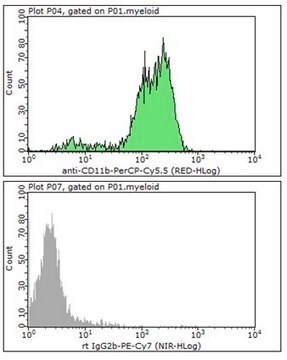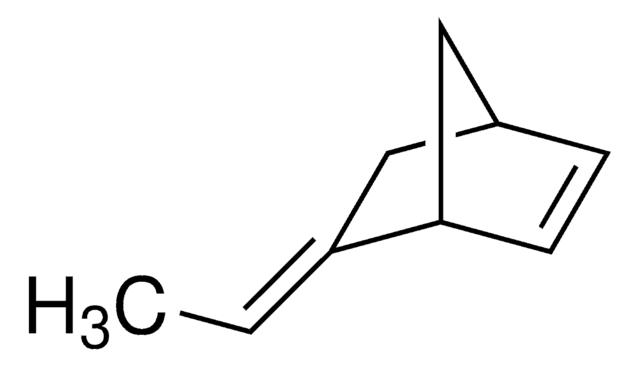O2501
1,7-Octadiene
98%
Sinonimo/i:
α,ψ-Octadiene
Autenticatiper visualizzare i prezzi riservati alla tua organizzazione & contrattuali
About This Item
Formula condensata:
CH2=CH(CH2)4CH=CH2
Numero CAS:
Peso molecolare:
110.20
Beilstein:
605288
Numero CE:
Numero MDL:
Codice UNSPSC:
12352100
ID PubChem:
NACRES:
NA.22
Prodotti consigliati
Livello qualitativo
Saggio
98%
Indice di rifrazione
n20/D 1.422 (lit.)
P. ebollizione
114-121 °C (lit.)
Densità
0.746 g/mL at 25 °C (lit.)
Stringa SMILE
C=CCCCCC=C
InChI
1S/C8H14/c1-3-5-7-8-6-4-2/h3-4H,1-2,5-8H2
XWJBRBSPAODJER-UHFFFAOYSA-N
Cerchi prodotti simili? Visita Guida al confronto tra prodotti
Descrizione generale
1,7-Octadiene can serve as a crosslinker and source of ethylene for a variant of Mori′s conditions in CEYM-related reactions.
Applicazioni
1,7-Octadiene has been used in a study to assess the structure and reaction rate in olefin ring-closing metathesis of a series of simple dienes. It has also been used in a study to investigate micropatterned surfaces prepared by plasma polymerization.
Avvertenze
Danger
Indicazioni di pericolo
Consigli di prudenza
Classi di pericolo
Aquatic Chronic 3 - Asp. Tox. 1 - Flam. Liq. 2
Codice della classe di stoccaggio
3 - Flammable liquids
Classe di pericolosità dell'acqua (WGK)
WGK 3
Punto d’infiammabilità (°F)
50.0 °F - closed cup
Punto d’infiammabilità (°C)
10 °C - closed cup
Dispositivi di protezione individuale
Eyeshields, Faceshields, Gloves, type ABEK (EN14387) respirator filter
Scegli una delle versioni più recenti:
Possiedi già questo prodotto?
I documenti relativi ai prodotti acquistati recentemente sono disponibili nell’Archivio dei documenti.
Santos Fustero et al.
Chemistry (Weinheim an der Bergstrasse, Germany), 18(35), 10991-10997 (2012-08-02)
The use of 1,7-octadiene as an in situ source of ethylene led us to develop a novel multicomponent tandem cross-enyne metathesis (CEYM)-Diels-Alder reaction. The process can be considered a relay metathesis, in which the ethylene liberated in the ring-closing metathesis
E Filová et al.
Physiological research, 58(5), 669-684 (2008-12-20)
Micropatterned surfaces have been used as a tool for controlling the extent and strength of cell adhesion, the direction of cell growth and the spatial distribution of cells. In this study, chemically micropatterned surfaces were prepared by successive plasma polymerization
B F P McVey et al.
Langmuir : the ACS journal of surfaces and colloids, 33(35), 8790-8798 (2017-05-30)
The role surface capping molecules play in dictating the optical properties of semiconductor nanocrystals (NCs) is becoming increasingly evident. In this paper the role of surface capping molecule polarity on the optical properties of germanium NCs (Ge NCs) is explored.
M Ramiasa-MacGregor et al.
Nanoscale, 8(8), 4635-4642 (2016-02-09)
The wetting of a material can be tuned by changing the roughness on its surface. Recent advances in the field of nanotechnology open exciting opportunities to control macroscopic wetting behaviour. Yet, the benchmark theories used to describe the wettability of
Rahul M Visalakshan et al.
ACS applied materials & interfaces, 11(31), 27615-27623 (2019-07-17)
The nature of the protein corona forming on biomaterial surfaces can affect the performance of implanted devices. This study investigated the role of surface chemistry and wettability on human serum-derived protein corona formation on biomaterial surfaces and the subsequent effects
Il team dei nostri ricercatori vanta grande esperienza in tutte le aree della ricerca quali Life Science, scienza dei materiali, sintesi chimica, cromatografia, discipline analitiche, ecc..
Contatta l'Assistenza Tecnica.










